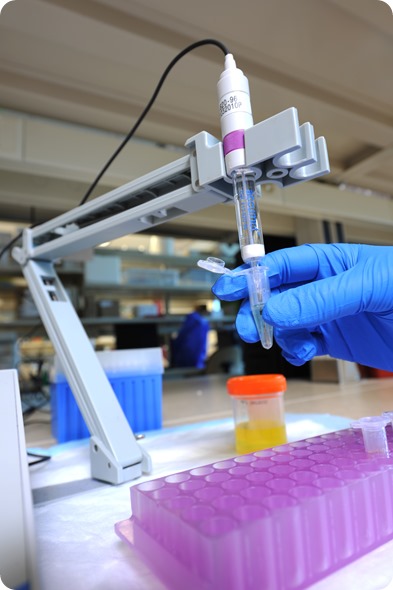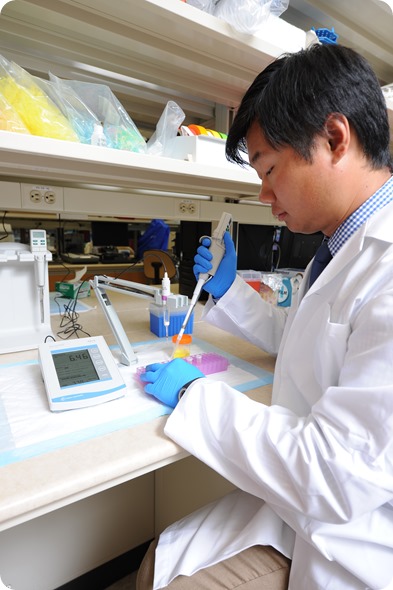Colorectal cancer is a leading cause of death in North America, but it is preventable if found at the colonic polyp stage. Currently, only 39% of colorectal cancer cases in the US are diagnosed at an early and treatable stage. The five year survival rate for colorectal cancer is only 63.5% compared to 95% for colonic polyps, and over 95% of colorectal cancer arise from colonic polyps.
Unfortunately, current fecal-based polyp screening methodologies are suboptimal due to a lack of sensitivity and patient acceptability. Current fecal based test have three challenges: poor compliance (patients must collect their own stool sample), sample integrity (samples often are not collected properly), and poor sensitivity (not ideal for large population based screening).
Early intervention has the potential to reduce the high healthcare costs associated with treating colon cancer, such as surgery and hospitalization.

Urine sample being processed.
Please can you outline how the urine test works?
The test focuses on compounds produced during the body’s various metabolic processes. We have successfully identified the existence of a unique metabolite biomarker profile in urine samples of patients with colonic polyps, which are distinct from healthy individuals and individuals with colon cancer. Unlike fecal-based tests, MTI’s urine-based PolypDx™ detects polyps before they become cancerous.
How accurate is the test at detecting colonic polyps? How has this been tested?
Version 1.0 of the nuclear magnetic resonance (NMR) based PolypDx™ test for colonic polyps was discovered and validated using 1,200 samples collected in a clinical trial attached to the Edmonton colon cancer screening program (SCOPE) in conjunction with Alberta Health Services (formerly, Capital Health).
This clinical trial compared the sensitivity and specificity of the urine metabolomics test (PolypDx™) and fecal-based tests (fecal-guaiac and fecal-immune) relative to the gold standard of full colonoscopy by expert gastroenterologists.
Based on results of the 1,200 patient clinical trial, we found that the urine-based test could detect polyps with a sensitivity of 71 per cent. In contrast, standard of care fecal-based tests are designed to detect colorectal cancer – not colonic polyps.
When used to detect polyps, fecal-based tests have sensitivities of 1 to 15 per cent. Therefore, PolypDx™ represents a significant advance in polyp detection.
What were the main hurdles you faced when developing this unique diagnostic system and how were these overcome?
Apart from the trials and tribulations associated with running a large scale clinical trial, a main hurdle in the development of this test has been identifying key collaborators who are experts in this cutting-edge field of research.
The critical factor to success is establishing collaborations and strategic partnerships both locally and internationally.
Locally, MTI is working with the University of Alberta (The Metabolomic Innovation Centre and Alberta Innovates Centre for Machine Learning), Alberta Health Services and DynaLIFEDx to commercialize the new urine-based test for pre-cancerous polyps.
Globally, MTI is collaborating with BGI Shenzhen to conduct a 1,000 patient clinical trial in China.
The major challenge going forward is to turn this initial clinical discovery into an effective diagnostic test, which can be used to screen the general population for colonic polyps and/or colorectal cancer.

Victor Tso, Scientific Officer, processing a urine sample.
What work still needs to be done to optimize the test for large scale population screening?
PolypDx™ was developed and validated using an instrument known as nuclear magnetic resonance (NMR). While the NMR-based tests are currently commercializable, the cost and availability of NMR systems limit the production capacity to meet the demands of large scale, population-based screening programs.
To address this issue, versions 2.0 of PolypDx™ will require a higher throughput platform that is more cost-effective and more readily available.
In addition to conducting research related to the precise set of metabolites that the test considers as well as the type of technology used to detect them, we are also running a 500 patient validation trial in Lethbridge, Alberta, Canada to test the logistics of carrying out this screening test in the community.
What impact do you think this test will have on the prevention of colorectal cancers?
The notion of prioritizing patients for colonoscopy testing is not new. In many centres worldwide, including Alberta, healthcare practitioners screen patients by testing stool samples for traces of blood, which can signal colon problems including cancer.
Unfortunately, fecal tests are not designed to find pre-cancerous polyps, and only detect colon cancer around half the time. Moreover, many patients are either reluctant to collect their own samples or are not adept at doing so.
Consequently, many healthcare professional still rely heavily on colonoscopy for finding polyps and colon cancers, even though most patients tested by colonoscopies are ultimately found to be polyp- and cancer-free.
MTI’s urine-based PolypDx™ test for pre-cancerous polyps offers opportunity for increase patient survival rate and overall savings in healthcare costs (i.e. cancer treatment and hospitalization). The test is non-invasive, and does not require dietary restrictions or unpleasant fecal collections, which will increase patient compliance.
What are MTI’s plans for the future?
As mentioned before, we are working on developing version 2.0 of PolypDx™, which will be on a higher throughput and more readily available platform to meet the demands of large scale population based screening programs.
In addition to PolypDx™, MTI’s platform technology has the potential applications in other chronic disease, including gastrointestinal disease and other types of cancers.
MTI also has several exciting new products that are in the early stages of R&D, including a distinct signature for colorectal cancer itself (ColoDx™).
MTI has begun the sample collection and spectral acquisition of samples for both breast and prostate cancer. The breast and prostate cancer samples are being collected at hospitals located in Edmonton.
What do you think the future holds for metabolomics-based diagnostic tests?
Metabolomics refers to the study of metabolite biomarkers (‘metabolites’), which are tiny molecules produced by human cells at the end of cellular activities (i.e. energy consumption). Since metabolites are produced as an end product of cell activities, they give us a unique opportunity to see what has already occurred in the cells.
For instance, cells that cause cancerous growths or colonic polyps will produce different metabolites than normal cells. By studying these metabolites, we have the opportunity to detect cancer and colonic polyps as well as a variety of other chronic diseases.
Metabolomics is one of the newer sciences in molecular diagnostics, and has a strategic advantage over DNA-based tests.
The challenge with many DNA-based tests is that the information received is typically not directly related to the presence of a particular disease, but rather, the propensity of an individual to be susceptible to that disease. While useful, this information has little impact on personal behaviour and often does not warrant any action from the healthcare system.
Metabolomics-based disease detection has the ability to accurately identify a disease state at an early stage providing a more cost effective solution and favourable health outcomes.
Where can readers find more information?
For further information, please visit the Metabolomic Technologies website: www.metabolomictechnologies.ca
A video news clip is also available: http://www.ctvnews.ca/simple-urine-test-might-spot-early-colorectal-cancer-1.641214
About Dr. Haili Wang
 Dr. Haili Wang is a colorectal surgeon at the University of Alberta Hospital and an Assistant Professor of Faculty of Medicine at the University of Alberta.
Dr. Haili Wang is a colorectal surgeon at the University of Alberta Hospital and an Assistant Professor of Faculty of Medicine at the University of Alberta.
Her area of research expertise relates to urine metabolomics and colorectal cancer screening. Dr Wang has presented at numerous clinical and scientific conferences and has an in-depth knowledge of metabolomics and colorectal cancer.